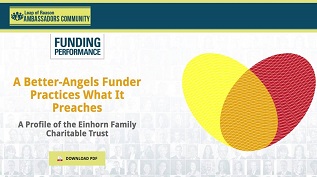The Right Kind of Tears

Editor’s Note: Read the full profile of Einhorn Family Charitable Trust here.
On a day when snowfall slowed the normal bustle of Midtown Manhattan, Lowell Weiss and Jennifer Hoos Rothberg, the dynamic executive director of the Einhorn Family Charitable Trust, had a leisurely two hours to continue their longstanding dialogue about how funders can pay careful heed–not just lip service–to what their grantees need for improving performance.
EFCT is deeply admired by its grantees for practicing what they preach about supporting their pursuit of high performance. EFCT has taken a “fewer, deeper, longer” approach that allows them to build respectful, trusting relationships with their grantee partners. No funder has ever managed to transcend the inherently unequal power between grantor and grantee. But Rothberg and her small team of listeners and learners have come as close as we’ve ever seen.
Over a lunch of take-out gyros, Lowell asked Rothberg to help him understand the ways the Performance Imperative (PI) and Performance Imperative Organizational Self-Assessment (PIOSA) have supported that journey. “At first some members of our team looked at me like ‘you’re crazy’ when I suggested fully adopting and integrating the PI into every facet of our work and using these tools directly with our partners,” Rothberg says. “Now some of my colleagues who were the most skeptical have become the biggest evangelists. I’ve literally had people start crying in staff meetings, saying, ‘I finally have a language, a definition, and clear tools to help my partners understand what I’m asking for and how we want to help!’”
EFCT is now focusing due-diligence meetings with prospective grantees on individual pillars from the PI and practices from the PIOSA. And for existing grantees, the PI’s principles and PIOSA’s proof points (specific practices that represent manifestations of that principle in action) are at the core of their progress updates for EFCT and other stakeholders.
Instead of asking grantees to submit a typical, compliance-driven end-of-year report, EFCT instead shares a grant reporting framework that helps grantees use the PI and PIOSA to “assess progress, check assumptions, and recalibrate as necessary based on what you’ve learned over the previous period.” Consistent with its emphasis on continuous improvement, EFCT also asks grantees for candid feedback on the utility of the reporting process. On the framework document itself, EFCT shares this language: “Like you, we’re a learning organization; this is a work in progress, and we want it to ultimately serve your needs.”
The PI and PIOSA are also integrated into EFCT’s own Portfolio Dashboard, the centerpiece of the staff’s progress reports to its trustees. In addition to understanding how each grantee partner is progressing with respect to each of the PI’s seven pillars, the trustees can also look across the entire portfolio to identify patterns. For example, the current dashboard shows that EFCT grantee partners are generally doing well with regard to Pillar 3 (“Well-designed and well-implemented programs and strategies”) and Pillar 5 (“A culture that values learning”) but having more difficulty with Pillar 4 (“Financial health and sustainability”) and Pillar 7 “(External evaluation for mission effectiveness).”
EFCT doesn’t penalize grantee partners when they’re coming up short. Quite the opposite: It’s giving grantee partners extra support, through top experts in the field, to shore up any shaky pillars. “It’s all about improvement over the course of an investment. We’re not comparing one partner to another. We’re looking for patterns so that we can better support our entire portfolio, as well as individual organizations, to get stronger in the pillars where they need additional support. We are now working to have great external support at the ready for every individual pillar,” Rothberg reports.
Rothberg is gratified that the PI and PIOSA “are not just my thing anymore. They’re my team’s thing. And they’re increasingly becoming the operating model for some of our [top] partners, which is the ultimate goal.”
We hope the PI and PIOSA will become your thing as well. If you’re interested, drop us a line. We’d love to help.
